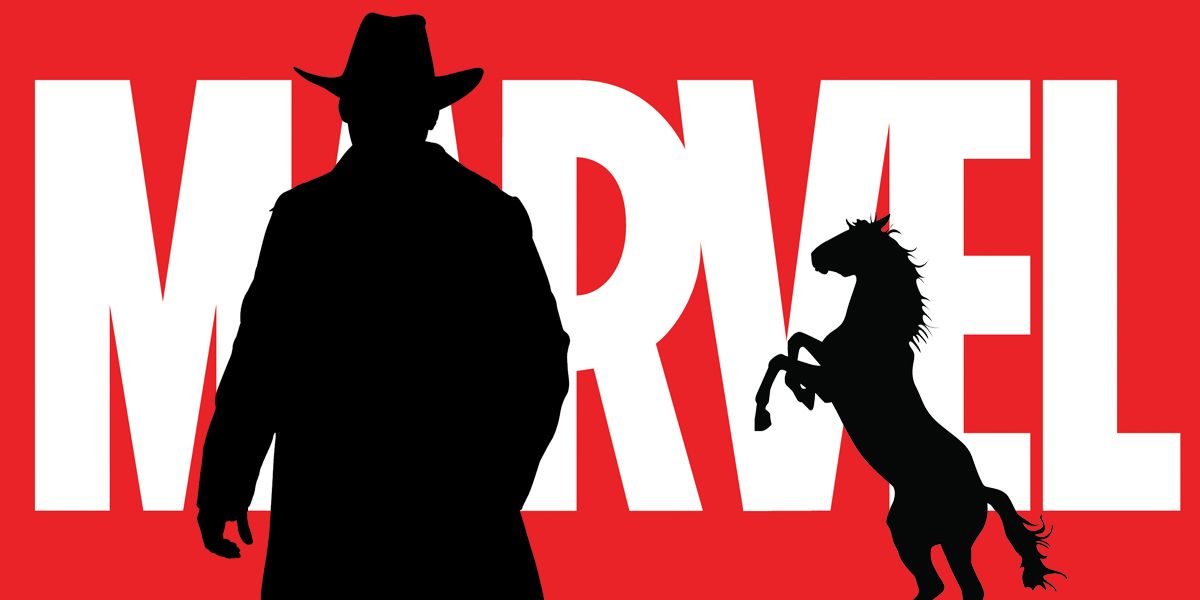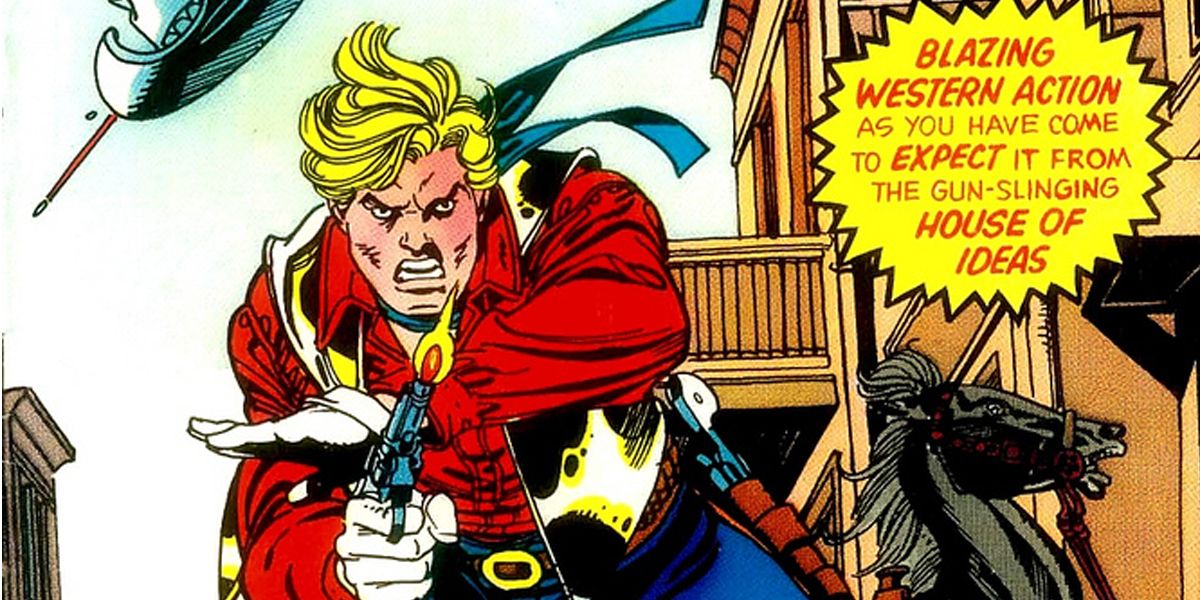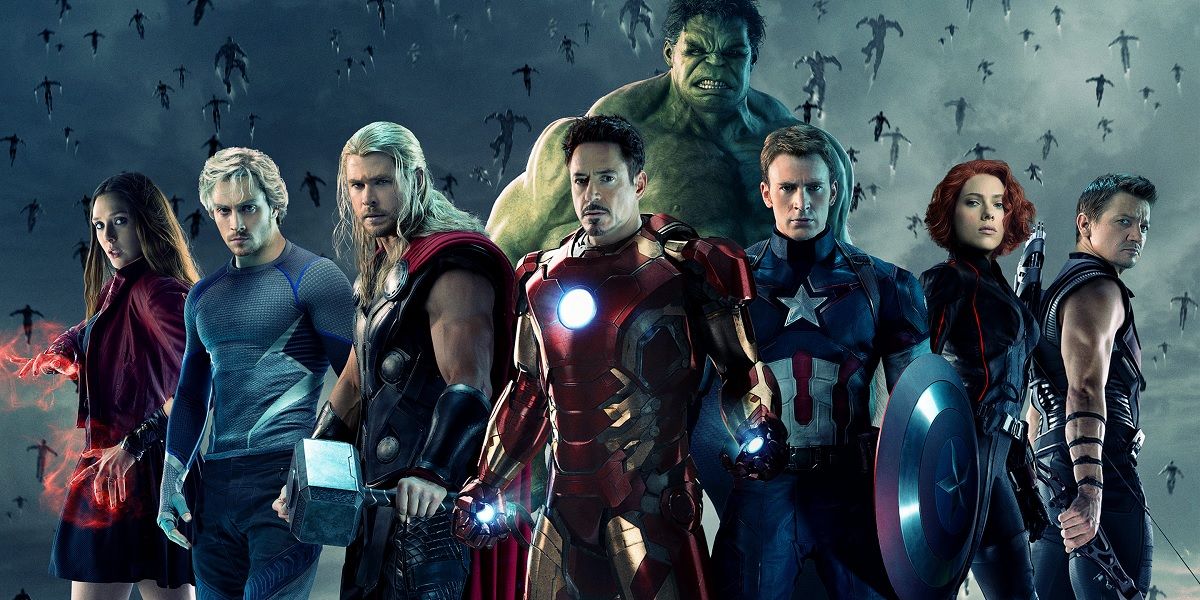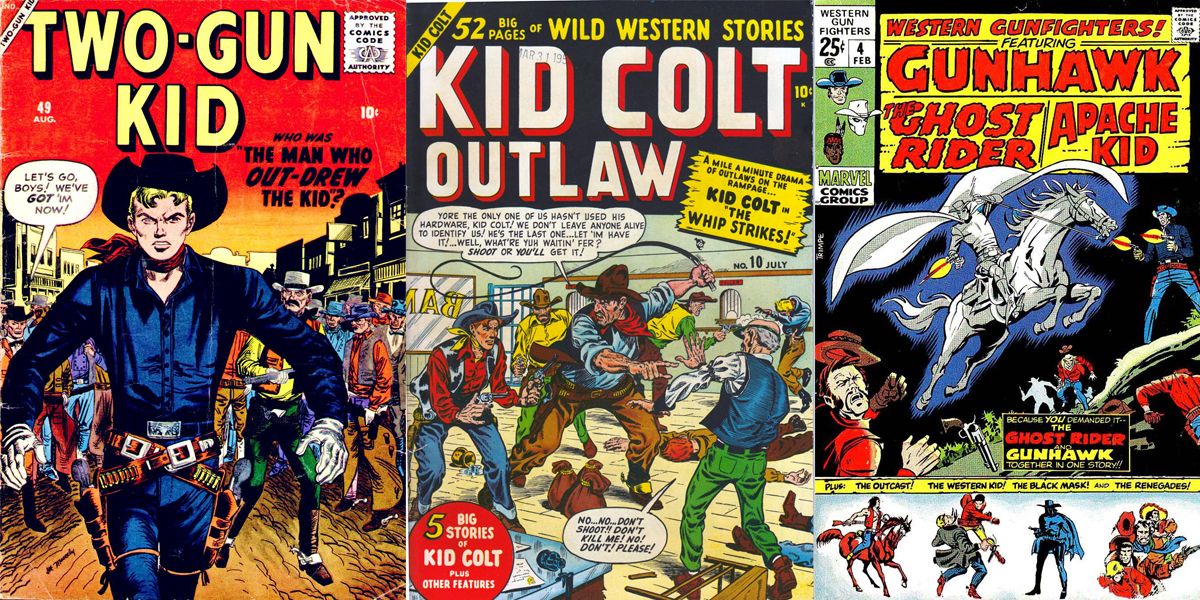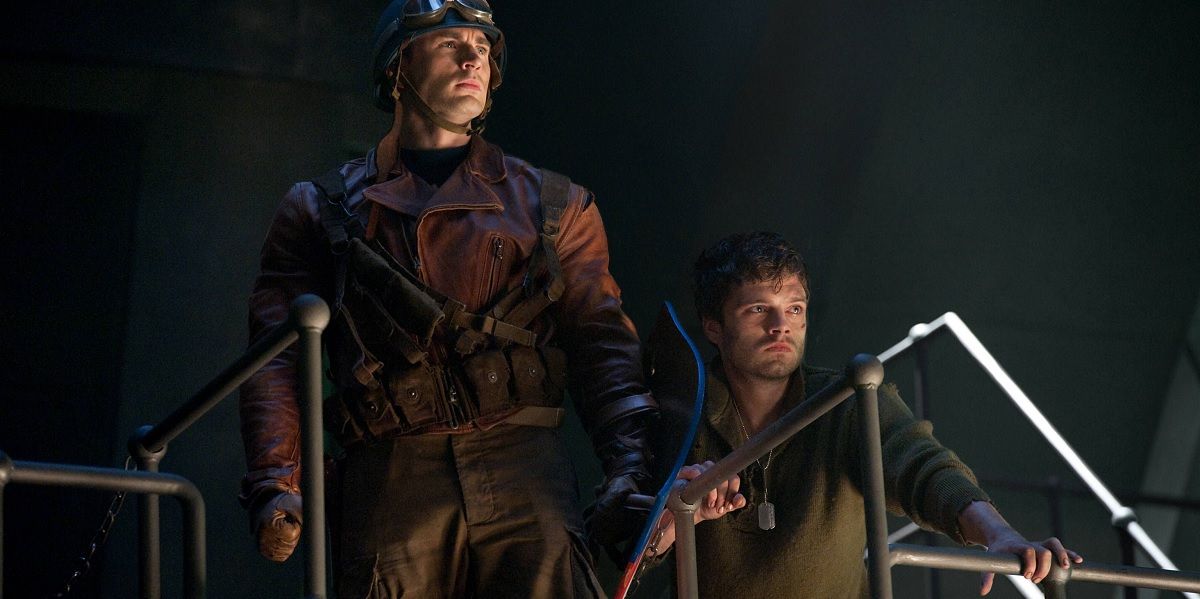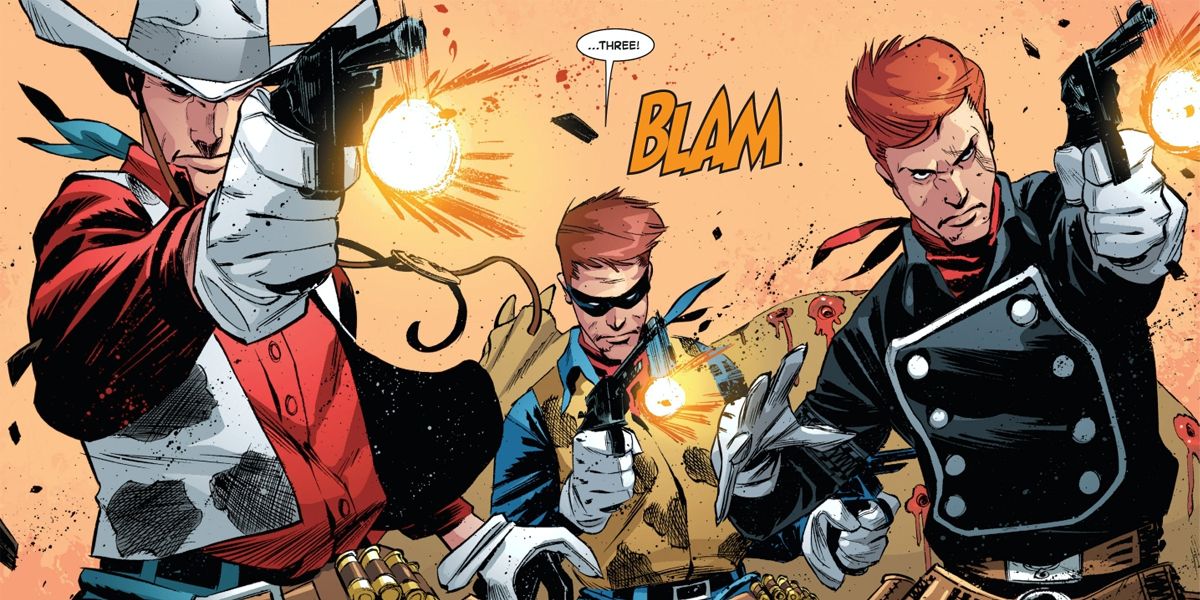The third episode of Agent Carter's second season features one of the more amusing bits of meta-humor to grace the Marvel Cinematic Universe in recent months: As part of the new season's Los Angeles-centered storyline, Howard Stark (Dominic Cooper) has followed the path of his real-life inspiration Howard Hughes by setting up his own movie studio, where Carter visits him during the production of a cowboy shoot-em-up where the ever ingratiating playboy cheekily offers her a role as an Old West love-interest. When Peggy (Hayley Atwell) replies that she'd rather play the gunfighter, Stark replies that he likes the idea - but audiences might not be ready for it. Replies Peggy: "Oh, but they're ready for a film based on a comic book?"
It's only then that we realize what movie Stark is actually making: An adaptation of Kid Colt, a period-appropriate western comic-book hero originally published by Marvel.
It's a clever exchange, riffing on Agent Carter's continued main theme of Peggy as a female action-hero ahead of her time and the commonly observed absurdity that somehow lady heroes are seen as more bizarre than the otherworldly goings on Marvel is already mining for films and TV shows. It also returns to the theme of how the MCU heroes are viewed by the popular culture of their own world, reminding us that fictionalized versions of Captain America's exploits were (canonically, according to The First Avenger) retold in comic form and that Steve Rogers himself was starring in Captain America movies before he was allowed to join the war effort for real. But it also raises an interesting possibility in terms of the continued expansion of the Marvel Cinematic Universe's reach and the legacy of superheroes in the popular imagination:
Why hasn't Marvel considered making a Western?
At first, the answer would seem fairly obvious: Though enormously popular for most of the 20th Century, Westerns are widely regarded as a dead or "niche" genre in modern Hollywood. The last attempt to revive the genre in big-budget blockbuster form, Disney's now-infamous reimagining of The Lone Ranger, bombed spectacularly with audiences and critics and remains a source of withering criticism for Johnny Depp's bizarre performance as the Native American sidekick Tonto. Most other modern entries tend to be lower-budget affairs aimed largely at older audiences or the "arthouse" scene, with Clint Eastwood's pitch-black deconstructionist take Unforgiven having been recieved as a "eulogy" for the fading genre in 1992 and subsequent revivals like Tombstone and Open Range meeting only moderate success (even The Hateful Eight hasn't been one of Quentin Tarantino's bigger hits) and failing to kick-start a revival trend - a profound change for a genre that used to be the defining medium for blockbuster action stories and kid-friendly adventures.
However, over the years many pop-culture analysts have opined that the Hollywood Cowboy never really faded at all; instead, it's been posited that the Western genre simply outgrew the limitations of its own setting, and that the particular strain of heroic storytelling associated with the genre evolved into other forms - like cop movies in the 80s and 90s and comic-book superheroes in the new millennium. In fact, fans and sympathetic critics looking to defend the Marvel Cinematic Universe and the broader trend of comic book-based blockbusters from accusations that the genre now constitutes too much of Hollywood's production schedule routinely cite the onetime ubiquity of silver screen cowboys as a logical retort. After all, how can a handful of movies about costumed crimefighters each year be called "over-saturation" from an industry that at one point saw hundreds of cowboy adventures being cranked out by every major studio on an almost yearly basis?
There are, to be sure, some technical issues with that particular argument. For starters, production schedules of every genre were more packed in those days, and while Westerns were always big business they didn't always command full sweep of lavish budgets and big star attention. But there's a solid truth to the core premise beneath the genre-justification: When you strip out the genre-specific trappings of capes, cowls and magic hammers (or six-shooters, spurs and ten gallon hats) the line between the Hollywood Cowboy and the Hollywood Superhero becomes almost non-existent. Hopalong Cassidy and Roy Rogers were most assuredly the big-screen Superman and Batman of their day, and there'd be few inheritors to the late John Wayne's cowboy-persona as America's idealized self-image better suited than Chris Evans' Captain America. So, then, if superheroes are basically cowboys, why can't cowboys also be superheroes?
Marvel in particular has already proven that the global audience hunger for superheroic action is so fierce that moviegoers (and TV viewers) will accept a broad enough definition of "superhero" to cover a wide variety of genres: The Captain America, Iron Man and (soon) new Spider-Man movies occupy various realms of traditional comic book heroics, yes, but there's also the playful comedy of Ant-Man and the high-fantasy of the Thor franchise. The Guardians of The Galaxy are thought of as "superheroes" even though they and they're world are more accurately a cosmic space-opera in the vein of Star Wars. The Hulk's solo outing was a monster movie. Doctor Strange is a - literal - wizard. The Agents of S.H.I.E.L.D are spies and Jessica Jones is a hard-bitten neo-noir detective, but both are regarded as much a part of the MCU superhero-brigade as the more conventional costumed-hero Daredevil. If all these disparate characters and stories can be united not only in continuity but in box-office/ratings viability, why wouldn't it make sense for Marvel to turn its attention to the genre that is, in fact, the cinematic ancestor of the modern superhero itself?
NEXT PAGE: Marvel Comics and the Western Genre
Marvel certainly has the characters for a western film. In fact, before they were "The House of Ideas," Marvel (and its corporate forebears Timely Comics and Atlas Comics) were among the leading purveyors of cowboy and western-themed books in the Golden Age of Comics. From the late 1930s all the way up through the early 60s, Marvel's character stable was overloaded with heroes like The Phantom Rider, Masked Raider and Ghost Rider (a different, originally non-supernatural predecessor of the better known motorcyclist version), along with a particularly large number of heroes named "Kid": Kid Colt, Two-Gun Kid, Outlaw Kid, Apache Kid, Ringo Kid and more, all devoured by eager comics fans of their era. And though the genre waned in the mid-to-late 60s, anthology reprints of the classic tales like The Mighty Marvel Western kept many of the characters alive in the modern consciousness.
Marvel also returned to the genre frequently amid its modern focus on present-day superheroes, often reviving one-dimensional Golden Age cowboy heroes with greater depth and characterization or focusing on a broader diversity of perspectives on the history of the Old West: One of multiple characters to call himself "Gunhawk" was a former slave named Reno Jones who also briefly assumed the mantle of the original Ghost Rider. "Red Wolf" was an orphaned Native American hero who fought for peace between his people and White settlers. Starting in 2003, a new incarnation of The Rawhide Kid established the titular hero as one of Marvel's most prominent gay characters. More recently, the Secret Wars tie-in 1872 reimagined contemporary Marvel heroes as Old West analogs. There are dozens upon dozens of these characters in the Marvel stable (one database listed as many as 150 in total, encompassing villains and alternate-versions) and while most of them would likely be even more obscure than Ant-Man to modern audiences, well... so were Rocket Raccoon and Groot only two short years ago.
And there's certainly plenty for a Marvel Cinematic Universe cowboy to do: Nobody said all those Infinity Stones had to arrive on Earth in contemporary times, right? And so many characters being ripe for the picking could allow them to assemble a stable of the most interesting figures into a team adventure - The Avengers meets The Magnificent Seven? The genre is also famously malleable, allowing the potential for mature-focused exploits of one character in the vein of a Sergio Leonne "Spaghetti Western" epic to coexist with the more family-friendly adventures of another more along the lines of the aforementioned Rogers or Cassidy. After all, Westerns didn't just used to be popular; they used to be prestigious: What if all that's been missing to potentially bring "serious" awards Oscar gold to the Marvel bookshelf has been some of that fancy horse ridin' and fancier shootin' beloved by the Old Guard of various voting bodies?
On a pure "look at me!" level, it could be a huge boon to the publicity-loving Disney affiliate, who seem to never pass up an opportunity to show off just how powerful their brand name actually is in terms of wooing huge audiences to bizarre and offbeat material. Few achievements remain that would be a more impressive feather in the cap of Marvel's famously attention-loving boss Kevin Feige than to be able to say they were the ones who broke the decades-long streak of Westerns being box-office poison - and they probably wouldn't have to spend that much money to do it. One of the reasons Westerns were so ubiquitous back in the old days was that, compared to reconstructing Ancient Rome or a futuristic world, hauling actors and crew to various deserts and prairies in the U.S. and worldwide that look like the popular conception of the wild west has always been fairly affordable; probably not far outside the range of the $140 million (small, compared to some later Marvel productions) they spent to recreate WWII Europe and 1940s New York for Captain America: The First Avenger.
More substantively, the genre affords the chance for the studio to stretch its legs into more serious-minded territory and answer some of the criticisms that its output largely lacks depth and consequence. While fantasy-tinged Westerns would certainly be a possibility for Marvel (although maybe not, after Cowboys & Aliens failed to ignite the box-office) and would help individual cowboy adventures tie into the broader Cinematic Universe, even a semi-unreal Western would still have to grapple with a lot of the same cultural and historical issues that helped make he original genre fall out of fashion in the first place. Popular views of the "wild west" have changed over the years as American culture has grown more honest about its own history regarding the treatment of ethnic minorities, women and other marginalized communities; and the Western genre is consistently rife with such issues since so much of its actual history involved the ongoing fallout from the Civil War. And, of course, there's the even more persistent issue of how the genre itself famously helped to demonize Native Americans and the peoples of neighboring Mexico.
But rather than being an impediment, one could argue that such issues are a reason to make Marvel Westerns. Few are seriously looking for an outfit like Marvel to start producing blunt social-justice message movies, but they've already proven that they're more than willing to tackle topics of substance through the lens of the superhero genre: As mentioned earlier, Agent Carter is all about the post-WWII setbacks of the nascent feminist movement. Captain America: The Winter Soldier was a blistering critique of U.S. homeland security policy. Iron Man 3 built its famously controversial central plot-twist around the exaggerating of paranoia about foreign terrorism for corporate and political profit. Jessica Jones' arch-nemesis, Kilgrave, is literally a walking metaphor for sexual-assault and our unwillingness to believe victims of the same. While reviving audience's love for cowboys and six-guns with a superheroic-twist would be fun in and of itself, using the opportunity to forge a forward-thinking path for the genre's success with modern viewers could be downright revolutionary.
So, yes, it would probably be a very good idea (or, at least, one hell of an experiment) for Marvel to jump into the Western genre. Maybe they will, maybe they won't - or maybe they already have. The Kid Colt joke in Agent Carter that touched off this bout of speculation ends on an odd final detail, with Howard Stark explaining that Kid Colt was a real person and, thus, that his film counts as a historic recreation - and a tax write-off. Funny, but there's one thing wrong with it: Kid Colt wasn't based on a real figure, he was entirely fictional... or, rather, he was in our reality. Howard Stark's words would seem to imply that in the reality of the Marvel Cinematic Universe the Kid Colt comics were written about a real person just like Captain America's were. If so, it's an unusual random detail to bring up just for a quick laugh in an exposition-heavy series like Agent Carter, so is it possible that it's something more? Could Marvel already be ahead of the game, plotting to do something substantial with Kid Colt and/or his fellow cowboy heroes and dropping this detail into Carter as one of their famous Easter Eggs?
... Okay, maybe not, but the mere implication that Marvel might try its hand at one of the few remaining genres it hasn't conquered could be an even bigger clue - a clue as to how the Cinematic Universe might really be able, as Disney's Bob Iger recently put it, "Go on forever."
NEXT: 25 Movies Marvel Should Consider for Phase 4
Captain America: Civil War will release on May 6, 2016, followed by Doctor Strange– November 4, 2016; Guardians of the Galaxy 2 – May 5, 2017; Spider-Man – July 7, 2017; Thor: Ragnarok – November 3, 2017; Black Panther – February 16, 2018; The Avengers: Infinity War Part 1 – May 4, 2018; Ant-Man and the Wasp – July 6, 2018;Captain Marvel – March 8, 2019; The Avengers: Infinity War Part 2 – May 3, 2019; Inhumans – July 12, 2019; and as-yet untitled Marvel movies on May 1, July 10 and November 6, 2020.

